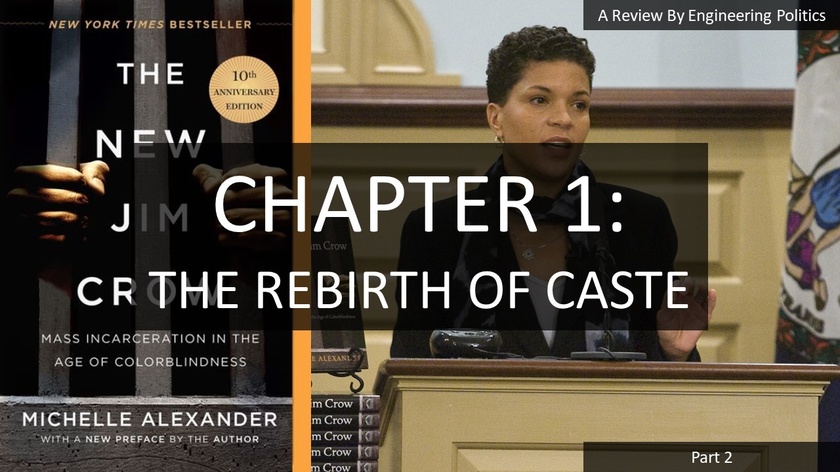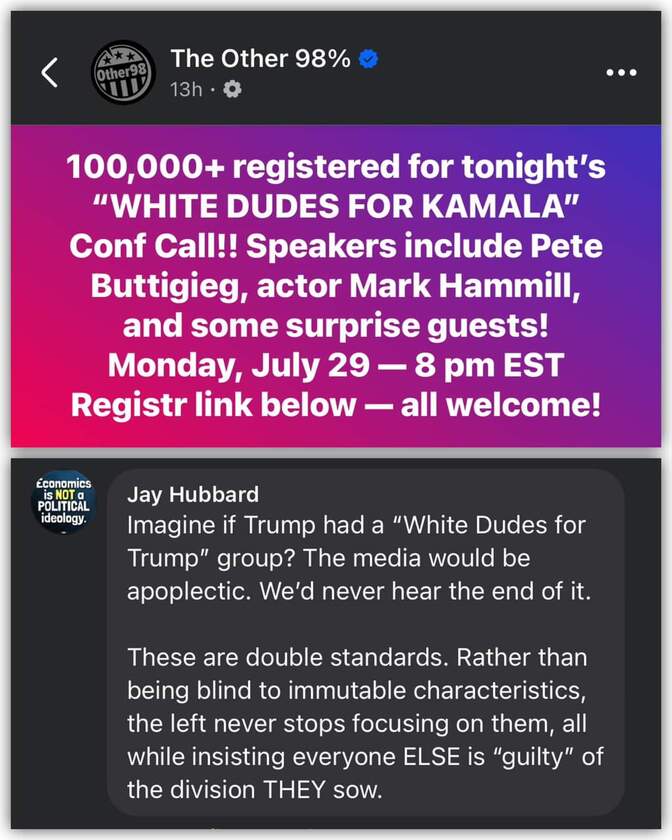
We continue our journey through the deep, dark hole that is race-crazed Leftist insanity with part 2 of the Chapter 1 review. I am trying my best to take this book seriously, but the first few chapters are making that task very difficult. Unfortunately, I cannot go to church and pray for these people, like we all ought to, but the powerful hand of the government is making that impossible at the time. See what happens when government is too powerful? But Alexander only seems to care when the government is doing things she does not like. #LeftistLogic
Alexander continues the chapter in a section she calls The Death of Slavery. In this section, she goes over how the Civil War ended slavery but not the idea of race difference. She cites French sociologist Loic Wacquant here:
“In Wacquant’s works: ‘Racial division was a consequence, not a precondition of slavery, but once it was instituted it became detached from its initial function and acquired a social potency all its own.’ After the death of slavery, the idea of race lived on.”
So, this goes over what I said in the first part of the Chapter 1 review – slavery was the main influence towards racism rather than the other way around, which is what most people assume or are taught. I give credit for Alexander for recognizing this even though most of her peers do not. And as I also said previously, Jim Crow was the last large-scale attempt at maintaining the racial hierarchy that was a result of slavery, but Alexander takes it a step further by assuming white supremacy is the main driver in maintaining the idea of race differences. I would argue that Alexander is completely blind towards any possibility that white supremacy has been replaced with political supremacy by the same people who claim to fight against racism today.
Alexander continues the chapter by citing how America still had race issues after slavery. She talks about the problems during the Reconstruction Era, black codes, and several other historical facts that I do not dispute. Alexander’s historical facts are often accurate and insightful, even though she does not always characterize all historical events accurately – take the (inaccurate) characterization of the Constitution, Federalism, and the Electoral College from the last review as an example. She does mention the South’s reliance on slavery in terms of economics for a few sentences – explaining how the abolition of slavery really hurt the South economically – but never explains how it did not depress the North’s, or the world’s, economy as many Southern economists thought it would. The idea that Southern slavery, acting as free labor, propped up the American and world economy is often referred to as the King-Cotton Thesis where many activists who are interested in revising history like to make it seem like capitalism incentivized slavery. In fact, the exact opposite is true. Paid labor outcompetes free labor because (1) paid laborers have an incentive to produce more efficiently resulting in an increase of their wages, and (2) paid laborers have capital to buy goods which increases the consumer base. The South’s more primitive economy relied on free labor which is why they were behind everyone else. Alexander did not make any observation on competing economies which is why I think it is important to mention here.
Alexander then moves on to the next section called The Birth of Jim Crow. She goes over the events and social climate that led to Jim Crow laws being passed and this is where she starts building a political narrative. I will expand on what I mean as we go along.
“As African Americans obtained political power and began the long march toward greater social and economic equality, whites reacted with panic and outrage. Southern conservatives vowed to reverse Reconstruction and sought the ‘abolition of the Freedmen’s Bureau and all political instrumentalities design to secure Negro supremacy’.”
A few things stick out here. ‘African Americans’, as a whole, had a common goal to strive for equality. Very true. ‘Whites’, as a whole, did not react in “panic and outrage.” People who happened to be white “reacted in panic and outrage.” Maybe she was just being short here, but she was very precise in her language up to this point. This is a convenient shortcut to building a larger race narrative. The next part that stuck out to me, and is something she did often during this section of the chapter, is referring to the political pushback against free blacks as a ‘conservative’ movement. This reference does not seem like a mistake to me and, I imagine, is a tactic she is using to avoid an inconvenient counter-narrative. Conservative can mean many different things. It can refer to personal demeanor, status quo, or founding political ideology. Modern-day Conservatives are split on this meaning. Social-Conservatives believe in the conservative demeanor (think Mitt Romney) model, and the more Libertarian-Conservatives believe in the conserving founding principle model (think Ted Cruz). I would consider myself as part of the latter group. Then there is Alexander’s definition of conservative, as I derived by her apparent usage of the term, meaning someone who conserves the status quo. This is not an inaccurate usage, but she uses it to avoid the much more accurate descriptor in this case: conservative democrat.
“Conservatives blamed liberals for pushing blacks ahead of their proper station in life and placing blacks in positions they were unprepared to fill, a circumstance that had allegedly contributed to their downfall.”
She now uses the conservative label juxtaposed to the term liberal to setup the narrative going forward. The typical political observer probably thinks ‘conservative’ is a synonym for ‘Republican’ and ‘liberal’ is a synonym for ‘Democrat’. Little might that observer know, Democrats, all the way through the Civil Rights Era, defended slavery and segregation, and Republicans fought against those practices. I am still waiting for Alexander to cover that in this book, but I am not going to hold my breath.
Alexander than moves on to the next section of the chapter, and the last section I will cover in this review, called The Death of Jim Crow. She goes through the legislative events that lead up to the 1964 Civil Rights Act and 1965 Voting Rights Act. This is where she covers some economic concerns, and she did a good job at pulling back and not attacking free market capitalism, even though you could tell she wanted to.
“There was also increased concern that, without greater equality for African Americans, blacks would become susceptible to communist influence, given Russia’s commitment to both racial and economic equality.”
There are a few things people should avoid citing unironically: The words of Hitler in any positive fashion, the cinematic accomplishments of Spiderman 3, and racial and economic equality in Communist Russia (or any communist country). It just makes for bad commentary, but I guess it is true, everyone is equal in the gulag (even that was not really true). This is the only time she cites communism as opposed to the economic system we had then, but she did talk about President Lyndon B. Johnson’s War on Poverty as a positive note even though, as I mentioned in a previous review, the War on Poverty was declared during a time where poverty and government dependance was on the decline.
Alexander ends this section of the chapter by continuously shifting the narrative from ‘white supremacy incentivized by slavery’ to ‘Jim Crow laws incentivized by white supremacy’ to ‘implicit racial hierarchy incentivized by white supremacy’.
“Barred by law from invoking race explicitly, those committed to racial hierarchy were forced to search for new means of achieving their goals according to the new rules of American democracy.”
I know I have mentioned this in about every review of this book so far, but in a market where the declining currency is ‘racial supremacy’ – declining to the point it basically has no value – how is this idea so influential? There is the argument uneducated, poor whites might want to maintain a racial hierarchy so they are not on the bottom of the overall social hierarchy, but Alexander repeatably talks about how poor whites and all blacks came together to fight injustice (referenced many times throughout the chapter). This would mean middle to upper class whites would be the ones perpetuating white supremacy implicitly through institutions today, but educated whites tend to vote Democrat – the assumed party of racial equity. So, I am just really confused who stands to benefit from a racial hierarchy when there is no desire for it. Unless all whites secretly want to maintain the racial hierarchy, which is an argument made by many CRT types, there is no logic behind this argument. But who needs logic nowadays?
Thanks for reading my rant style review of Chapter 1 (Part 2) of The New Jim Crow: Mass Incarceration In The Age Of Colorblindness by Michelle Alexander. Please let me know if you find this useful. My goal here is to explain each chapter enough and in a somewhat objective way so others do not waste their time and money on investigating this material themselves. I always encourage anyone who wants to know more about the ideas in this book to go and read it themselves, but in case you do not want to, I am here for you. Please leave a comment with your thoughts.
Thanks for being a part of the Engineering Politics Locals Community!

I was listening to some news updates when I heard this CNN clip about the potentially hazardous water in East Palestine, and as soon as I heard her ask the question about whether or not her guest would drink the water, I IMMEDIATELY thought of this clip from South Park. Enjoy.
In this special episode of The Engineering Politics Podcast, Truman from Return To Reason is back for a new video and podcast series titled ‘Revisiting The Road To Serfdom’ where we review F.A. Hayek’s classic work, The Road To Serfdom. This episode covers ‘Chapter 15: The Prospects of International Order’.
This will be an ongoing series that covers the entire book. We put a ton of work into making this insightful and relevant, so we hope you enjoy watching/listening as much as we enjoyed reading and recording.
Become a subscriber of the Engineering Politics Locals Community to support this content. Also, consider joining the @ReturnToReason Locals Community to show Truman some support.
In this episode of The Engineering Politics Podcast, I team up with Truman from @ReturnToReason to interview one of the most intelligent and influential creators in the space of philosophy today. Stephen R.C. Hicks is a Professor of Philosophy at Rockford University, Executive Director of the Center for Ethics and Entrepreneurship, and Senior Scholar at The Atlas Society. He has written many books including Explaining Postmodernism and Nietzsche and the Nazis. We bring him on to talk about the social and political issues we are currently facing in America, and the West more broadly, and what the collectivist ideas of Jean-Jacques Rousseau might have to do with it.
Become a subscriber of the Engineering Politics Locals Community to support this content. Also, consider joining the @ReturnToReason Locals Community to show Truman some support.
In this special episode of The Engineering Politics Podcast, Truman from Return To Reason is back for a new video and podcast series titled ‘Revisiting The Road To Serfdom’ where we review F.A. Hayek’s classic work, The Road To Serfdom. This episode covers ‘Chapter 15: The Prospects of International Order’.
This will be an ongoing series that covers the entire book. We put a ton of work into making this insightful and relevant, so we hope you enjoy watching/listening as much as we enjoyed reading and recording.
Become a subscriber of the Engineering Politics Locals Community to support this content. Also, consider joining the @ReturnToReason Locals Community to show Truman some support.
In this episode of The Engineering Politics Podcast, I team up with Truman from @ReturnToReason to interview one of the most intelligent and influential creators in the space of philosophy today. Stephen R.C. Hicks is a Professor of Philosophy at Rockford University, Executive Director of the Center for Ethics and Entrepreneurship, and Senior Scholar at The Atlas Society. He has written many books including Explaining Postmodernism and Nietzsche and the Nazis. We bring him on to talk about the social and political issues we are currently facing in America, and the West more broadly, and what the collectivist ideas of Jean-Jacques Rousseau might have to do with it.
Become a subscriber of the Engineering Politics Locals Community to support this content. Also, consider joining the @ReturnToReason Locals Community to show Truman some support.
In this special episode of The Engineering Politics Podcast, Truman from @ReturnToReason is back for a new video and podcast series titled ‘Revisiting The Road To Serfdom’ where we review F.A. Hayek’s classic work, The Road To Serfdom. This episode covers ‘Chapter 14: Material Conditions and Ideal Ends’.
This will be an ongoing series that covers the entire book. We put a ton of work into making this insightful and relevant, so we hope you enjoy watching/listening as much as we enjoyed reading and recording.
Become a subscriber of the Engineering Politics Locals Community to support this content. Also, consider joining the @ReturnToReason Locals Community to show Truman some support.














